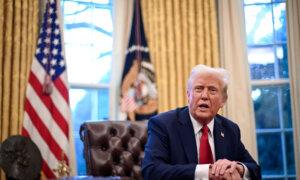The president said he’s in no hurry to speak to Chinese leader Xi Jinping as new U.S. tariffs on Chinese goods took effect on Tuesday
A call between President Donald Trump and Chinese leader Xi Jinping is yet to be scheduled, the White House told reporters on Tuesday as U.S. tariffs on Chinese goods took effect.
White House press secretary Karoline Leavitt made the remark after Trump’s top trade adviser, Peter Navarro, said the leaders were set to speak on Tuesday.
In an interview with Fox Business Network earlier in the day, Leavitt said, “President Xi did reach out to President Trump to speak about this, maybe to begin a negotiation. So we’ll see how that call goes.”
Trump, on Feb. 1, announced additional tariffs on goods from Canada, Mexico, and China, saying he’s holding the countries accountable for their failure to halt the flow of illegal immigration and poisonous drugs such as fentanyl into the United States. All new tariffs were set to take effect on Tuesday.
After Canadian Prime Minister Justin Trudeau and Mexico’s President Claudia Sheinbaum agreed to strengthen border control, Trump suspended the incoming tariffs. The Chinese regime on Tuesday hit back with counter tariffs and other retaliatory measures.
Questioned on Tuesday morning about how American businesses should prepare in light of Beijing’s retaliation, Navarro, the president’s senior counselor for trade and manufacturing, said,“ Let’s see what happens with the call today.”
Navarro declined to comment on whether Trump may also delay tariffs on Chinese goods, saying, “It’s up to the boss. I never get ahead of the boss.”
Also asked about the Chinese regime’s retaliation on Tuesday at the White House, Trump said, “That’s fine.”
The president said he’s in no hurry to speak to Xi.
On Feb. 1, Trump invoked presidential power in relation to an international and national emergency to impose an additional 10 percent tariffs on goods from China.
National Emergency
The new tariff also came with an end to the de minimis treatment of small packages from China.
Under the de minimis rule, packages valued under $800 can be imported duty-free and with minimal border inspection.
The rule, which is meant to minimize bureaucracy and reduce costs for customers, small businesses, and the government, has been exploited by Chinese e-commerce giants such as Shein and Temu and used to post small packs of fentanyl or precursors.
In the executive order, Trump said the inflow of drugs such as fentanyl via illegal networks has “created a national emergency, including a public health crisis.”
He expanded a national emergency at America’s southern border, which he declared on his first day in office, to cover Beijing’s failure to “arrest, seize, detain, or otherwise intercept chemical precursor suppliers, money launderers, other [transnational criminal organizations], criminals at large, and drugs.
In an apparent rebuttal of Beijing’s repeated denial of responsibility in helping fuel America’s fentanyl crisis, Trump said the communist regime’s “most sophisticated domestic surveillance network” and “most comprehensive domestic law enforcement apparatus” and its routine harassment of political dissidents outside of China, show it “does not lack the capacity to severely blunt the global illicit opioid epidemic; it simply is unwilling to do so.”
According to a report published in April 2024 by the House Select Committee on the Chinese Communist Party, the Chinese regime owned stakes in some companies that were openly advertising the sale of illegal drugs to the Americas and subsidized the companies.
Since January 2023, the U.S. Justice Department has indicted a number of Chinese chemical companies and executives over fentanyl.
Two executives, Qingzhou Wang, 36, and Yiyi Chen, 32, were convicted on Jan. 29 for selling more than 440 pounds of fentanyl precursors to undercover U.S. law enforcement agents.
Beijing’s Reaction
Reacting to Trump’s executive order on Feb. 2, a spokesperson for China’s Foreign Ministry said Beijing opposes the tariffs and “will take necessary countermeasures.”
The spokesperson said Beijing has supported the U.S. response to the fentanyl crisis, and that the problem belongs to the United States.
On Tuesday, China’s Ministry of Finance announced additional tariffs on some U.S. imports, including 15 percent on coal and liquefied natural gas and 10 percent on crude oil, farm machinery, a small number of trucks, and big-engine sedans.
China’s Ministry of Commerce added some tungsten, tellurium, bismuth, molybdenum, and indium products to its export control list and expanded its list of “unreliable entities” to include U.S. biotechnology company Illumina and clothing company PVH Corp, the holding company for brands including Calvin Klein.
On the same day, the State Administration for Market Regulation published a one-sentence statement announcing it had launched an anti-trust investigation into Google.
Reuters contributed to this report.







